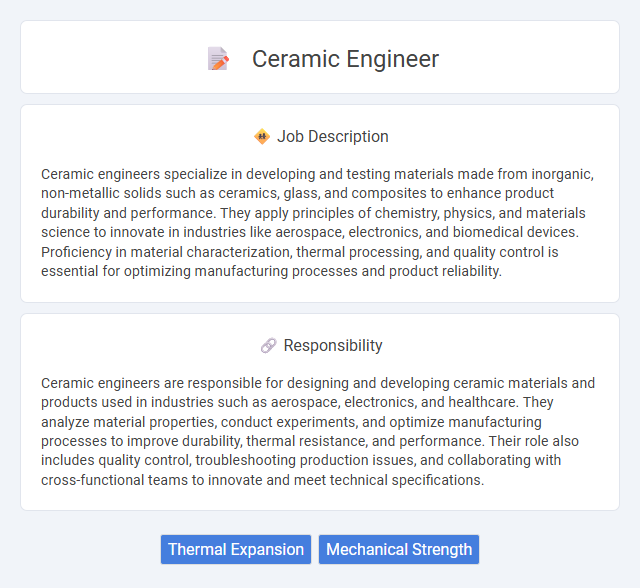
Ceramic engineers specialize in developing and testing materials made from inorganic, non-metallic solids such as ceramics, glass, and composites to enhance product durability and performance. They apply principles of chemistry, physics, and materials science to innovate in industries like aerospace, electronics, and biomedical devices. Proficiency in material characterization, thermal processing, and quality control is essential for optimizing manufacturing processes and product reliability.
Individuals with strong analytical skills and a passion for materials science are likely to excel as ceramic engineers. The role may suit those who enjoy working in laboratory and industrial settings, as well as solving complex problems related to the design and manufacturing of ceramic products. Candidates who prefer hands-on experimentation and possess patience for meticulous testing procedures might find this career particularly fulfilling.
Qualification
A ceramic engineer typically requires a bachelor's degree in ceramic engineering, materials science, or a related field, with strong knowledge in chemistry, physics, and material properties. Proficiency in computer-aided design (CAD), materials characterization techniques, and processing of ceramics is essential for success in this role. Advanced positions may demand a master's or doctoral degree, along with experience in research and development or quality control within ceramics manufacturing.
Responsibility
Ceramic engineers are responsible for designing and developing ceramic materials and products used in industries such as aerospace, electronics, and healthcare. They analyze material properties, conduct experiments, and optimize manufacturing processes to improve durability, thermal resistance, and performance. Their role also includes quality control, troubleshooting production issues, and collaborating with cross-functional teams to innovate and meet technical specifications.
Benefit
A ceramic engineer likely benefits from opportunities to work on cutting-edge materials that improve everyday products and industrial applications. They probably enjoy strong job stability due to the growing demand for advanced ceramics in technology, healthcare, and manufacturing sectors. Competitive salaries and the potential for innovation-driven career growth are additional advantages in this field.
Challenge
Ceramic engineering likely involves overcoming complex material science challenges related to heat resistance, durability, and structural integrity. Professionals in this field probably face difficulties in optimizing the properties of ceramics for diverse industrial applications, such as aerospace and electronics. The role may require innovative problem-solving to enhance the performance and sustainability of ceramic materials under extreme conditions.
Career Advancement
Ceramic engineers specializing in materials science can accelerate their career advancement by gaining expertise in advanced ceramic composites and nanomaterials, which are critical for aerospace and biomedical applications. Pursuing professional certifications such as Certified Materials Scientist (CMS) and engaging in research publications enhances their credibility and opens opportunities for leadership roles in R&D departments. Mastery of computer-aided design (CAD) software and experience with scalable manufacturing processes further position ceramic engineers for senior engineering and project management positions.
Key Terms
Thermal Expansion
Ceramic engineers specialize in designing and developing materials with controlled thermal expansion properties to enhance performance in high-temperature applications. They utilize advanced techniques to tailor the coefficient of thermal expansion (CTE) for ceramics, ensuring structural integrity and minimizing thermal stress in aerospace, electronics, and manufacturing industries. Mastery of thermal expansion behavior allows ceramic engineers to innovate durable, heat-resistant components critical for extreme environments.
Mechanical Strength
Ceramic engineers specialize in developing materials with enhanced mechanical strength, focusing on optimizing fracture toughness, hardness, and thermal stability for industrial applications. They utilize advanced techniques such as sintering, hot pressing, and microstructural analysis to improve the mechanical properties of ceramics used in aerospace, automotive, and electronics. Expertise in material characterization and stress testing ensures the durability and performance of ceramics under extreme conditions.
 kuljobs.com
kuljobs.com